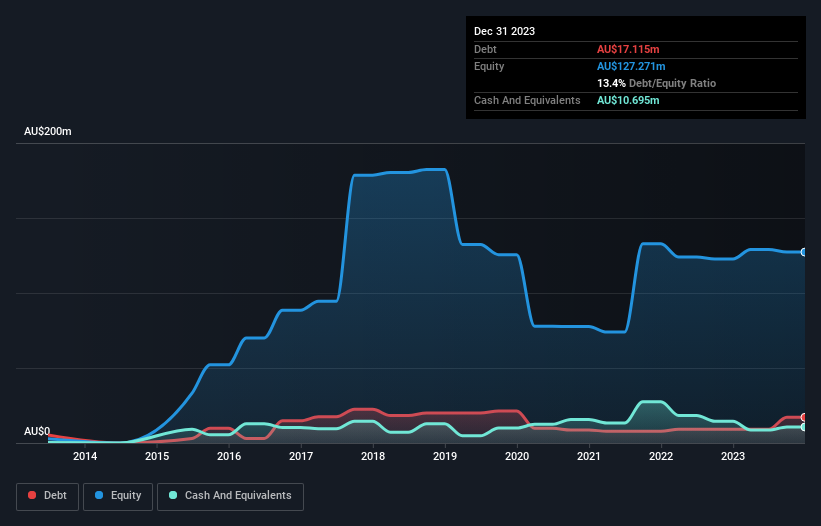David Iben put it well when he said, 'Volatility is not a risk we care about. What we care about is avoiding the permanent loss of capital.' When we think about how risky a company is, we always like to look at its use of debt, since debt overload can lead to ruin. We can see that Experience Co Limited (ASX:EXP) does use debt in its business. But is this debt a concern to shareholders?
When Is Debt Dangerous?
Debt and other liabilities become risky for a business when it cannot easily fulfill those obligations, either with free cash flow or by raising capital at an attractive price. Part and parcel of capitalism is the process of 'creative destruction' where failed businesses are mercilessly liquidated by their bankers. While that is not too common, we often do see indebted companies permanently diluting shareholders because lenders force them to raise capital at a distressed price. By replacing dilution, though, debt can be an extremely good tool for businesses that need capital to invest in growth at high rates of return. When we examine debt levels, we first consider both cash and debt levels, together.
See our latest analysis for Experience Co
What Is Experience Co's Debt?
As you can see below, at the end of December 2023, Experience Co had AU$17.1m of debt, up from AU$9.24m a year ago. Click the image for more detail. However, it also had AU$10.7m in cash, and so its net debt is AU$6.42m.

How Healthy Is Experience Co's Balance Sheet?
Zooming in on the latest balance sheet data, we can see that Experience Co had liabilities of AU$36.4m due within 12 months and liabilities of AU$31.3m due beyond that. Offsetting these obligations, it had cash of AU$10.7m as well as receivables valued at AU$4.44m due within 12 months. So its liabilities total AU$52.6m more than the combination of its cash and short-term receivables.
While this might seem like a lot, it is not so bad since Experience Co has a market capitalization of AU$121.2m, and so it could probably strengthen its balance sheet by raising capital if it needed to. But it's clear that we should definitely closely examine whether it can manage its debt without dilution. There's no doubt that we learn most about debt from the balance sheet. But ultimately the future profitability of the business will decide if Experience Co can strengthen its balance sheet over time. So if you want to see what the professionals think, you might find this free report on analyst profit forecasts to be interesting.
In the last year Experience Co wasn't profitable at an EBIT level, but managed to grow its revenue by 35%, to AU$119m. Shareholders probably have their fingers crossed that it can grow its way to profits.
Caveat Emptor
Despite the top line growth, Experience Co still had an earnings before interest and tax (EBIT) loss over the last year. To be specific the EBIT loss came in at AU$2.9m. When we look at that and recall the liabilities on its balance sheet, relative to cash, it seems unwise to us for the company to have any debt. Quite frankly we think the balance sheet is far from match-fit, although it could be improved with time. However, it doesn't help that it burned through AU$1.3m of cash over the last year. So suffice it to say we do consider the stock to be risky. There's no doubt that we learn most about debt from the balance sheet. However, not all investment risk resides within the balance sheet - far from it. Case in point: We've spotted 1 warning sign for Experience Co you should be aware of.
When all is said and done, sometimes its easier to focus on companies that don't even need debt. Readers can access a list of growth stocks with zero net debt 100% free, right now.
Valuation is complex, but we're here to simplify it.
Discover if Experience Co might be undervalued or overvalued with our detailed analysis, featuring fair value estimates, potential risks, dividends, insider trades, and its financial condition.
Access Free AnalysisHave feedback on this article? Concerned about the content? Get in touch with us directly. Alternatively, email editorial-team (at) simplywallst.com.
This article by Simply Wall St is general in nature. We provide commentary based on historical data and analyst forecasts only using an unbiased methodology and our articles are not intended to be financial advice. It does not constitute a recommendation to buy or sell any stock, and does not take account of your objectives, or your financial situation. We aim to bring you long-term focused analysis driven by fundamental data. Note that our analysis may not factor in the latest price-sensitive company announcements or qualitative material. Simply Wall St has no position in any stocks mentioned.
About ASX:EXP
Experience Co
Engages in the adventure tourism and leisure business in Australia and New Zealand.
Undervalued with reasonable growth potential.
Market Insights
Community Narratives



